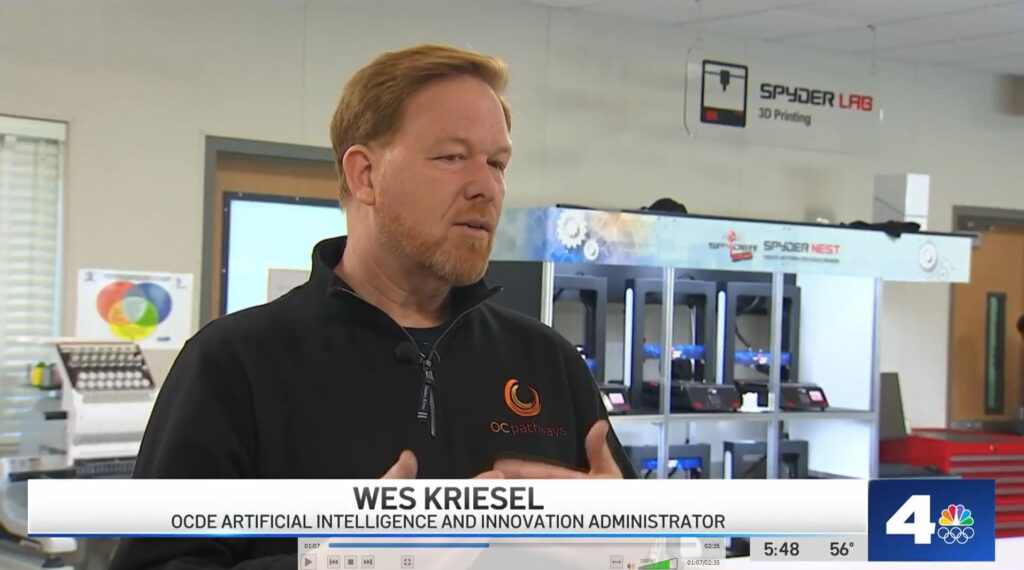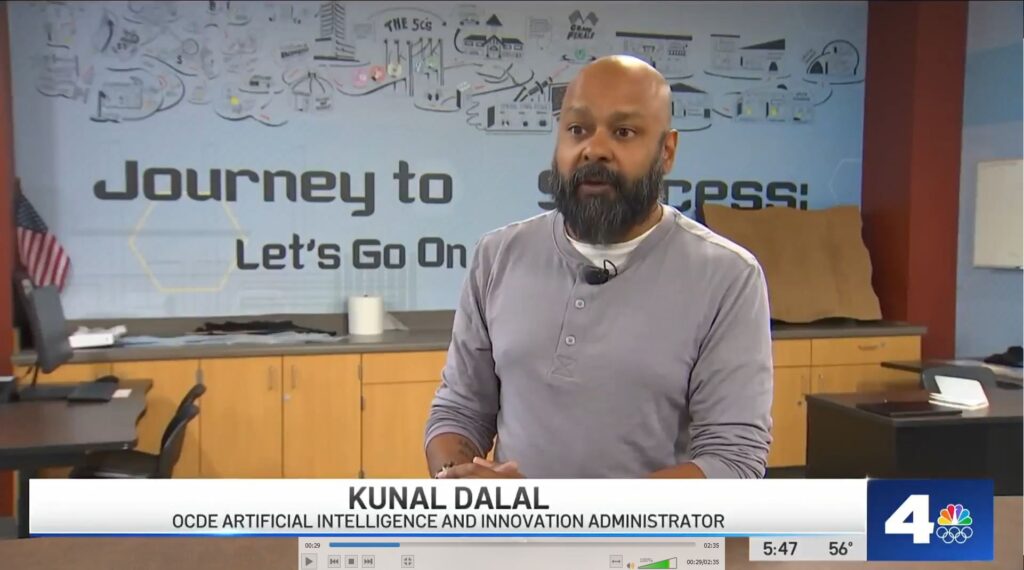Interview with Kunal Dalal and Wes Kriesel

After nearly 2 months of waiting, I finally got to interview Wes Kriesel and Kunal Dalal from the Orange County Department of Education. These two visionaries are at the forefront of integrating artificial intelligence into the educational landscape, driving innovative changes across nearly 30 districts in Orange County, California! Both of these gentlemen have been a great source of inspiration for me personally, as well as many others.
Pioneering Educational Reforms
We began with Wes Kriesel outlining the primary goals of the Orange County Department of Education. “Our main objective,” Kriesel explained, “is to ensure that our students are not just passive recipients of knowledge but active participants in their learning journeys.” This philosophy underpins the department’s various initiatives to incorporate AI into classrooms, creating a more engaging and personalized learning experience.
Embracing AI in Classrooms
Kunal Dalal provided a comprehensive overview of how AI tools are enhancing educational outcomes. “AI has the potential to revolutionize how we approach education,” Dalal stated. “From adaptive learning platforms that cater to individual student needs to AI-driven analytics that help educators identify areas where students are struggling, the possibilities are endless.” He emphasized that these technologies are not meant to replace teachers but to empower them with better tools and insights.
Case Study: AI Implementation Success
During NBC’s video clip from April 4th 2024, when Hetty Chang shared a case study highlighting the successful implementation of AI in an Orange County school. “Students in this program showed a 20% improvement in their test scores within just one semester,” Chang reported. “This kind of progress is a testament to the effectiveness of AI when integrated thoughtfully and strategically into the curriculum.”

Overcoming Challenges
Despite the promising prospects, the integration of AI in education is not without its challenges. Kriesel and Dalal discussed some of the hurdles they faced, including resistance to change and concerns about data privacy. “One of the biggest challenges,” Kriesel noted, “is getting buy-in from all stakeholders, including parents, teachers, and students. There’s a natural hesitation when it comes to adopting new technologies.”
Addressing Privacy Concerns
Dalal also addressed the critical issue of data privacy. “We understand the concerns surrounding data privacy and are committed to ensuring that all student data is protected and used responsibly. It’s crucial to build trust among all stakeholders to facilitate the smooth integration of AI in education.”

A Revolutionary Summit
The conversation then shifted to a groundbreaking summit organized by Kriesel and Dalal, which marked a significant milestone in student leadership and engagement with AI. “This was an incredible revolution in student leadership,” I remarked, reflecting on the photos and posts I had seen from the event.

The Genesis of the Summit
Wes Kriesel recounted how the idea for the summit began. “It started with our ‘100 Conversations about AI in 100 Days’ initiative,” he said. “About 20 conversations in, we realized that while adults were talking about AI, the students had valuable insights and perspectives that were missing from the conversation.” This realization led to the planning of a student-led summit in just six weeks, which ultimately brought together 600-700 participants at the JW Marriott.
Student-Led Innovation
Kunal Dalal described the summit as a transformative experience. “Students did the keynote, led 14 breakout sessions, and engaged in discussions about AI in medicine, social justice, and even startups. The energy was incredible,” he said. “One student, who initially thought his presentation went terribly, couldn’t wait to do it again. It was about empowering students to share their perspectives and ideas on how AI can shape their future.”
Kunal has also written a wonderful book called “The AI Parent: How Artificial Intelligence Is Helping Me Become a Better Father” which is probably a handy thing to have if you are a parent with children in grade school!
Empowering Through Trust
A recurring theme in our discussion was the importance of trust in fostering innovation and student engagement. “We trust our students and believe in their capabilities,” Kriesel emphasized. “It’s about putting them in a problem space where they can thrive and grow.”
Building a Collaborative Community
Kriesel and Dalal also highlighted the collaborative use of AI to build community and enhance learning experiences. “We often use AI in a collaborative context,” Kriesel said. “For example, we use voice chat mode and pass the phone around in a group, allowing everyone to contribute to the creation of a story or solution. This approach fosters a sense of community and collective creativity.”

Looking Ahead: Global Teamwork
The episode concluded with a powerful message from Qasir Rafiq, a humanitarian worker with a mission to bridge the gap in AI knowledge and application in education across Asia, Africa, and the Middle East. Qasir’s ambitious “Mission 1 Million” aims to educate one million students in 1,000 days with advanced AI skills and responsible AI practices.
Qasir’s Vision
Qasir shared his inspiring journey and vision. “I started AI Future Lab to empower individuals and organizations with AI knowledge and capabilities. My goal is to ensure that local organizations and civil societies can effectively and responsibly utilize AI to manage their challenges,” he said. “Collaboration and partnership are crucial to achieving this mission.”
The Importance of Global Collaboration
Qasir emphasized the importance of global teamwork in advancing educational technologies. “If we do not act now, the gap between AI knowledge and application in different parts of the world will become insurmountable. We need to invest in teachers and students, and create an AI cluster that provides resources, advice, and recommendations to institutions worldwide,” he urged.
In Closing
Our 10th episode was a ton of fun and underscored the transformative power of AI in education and the importance of collaboration, trust, and global teamwork. From the innovative initiatives in Orange County to the ambitious goals of Qasir Rafiq, it’s clear that AI has the potential to revolutionize education and bridge gaps across the globe.
As we continue to explore and implement these technologies, it’s crucial to remain committed to responsible and inclusive practices that benefit all students and educators. Thank you for taking the time to read or watch. We’re really working to make a difference!
Subscribe to the AI Think Tank Podcast on YouTube. Would you like to join the show as a live attendee and interact with guests? Contact Us

